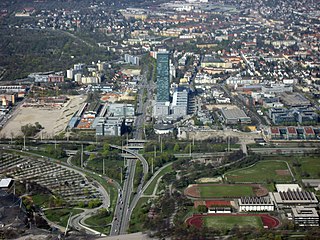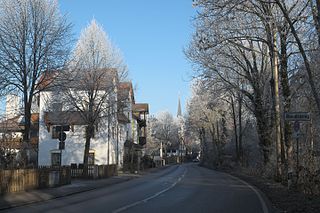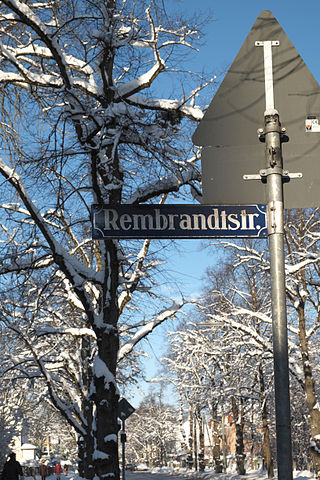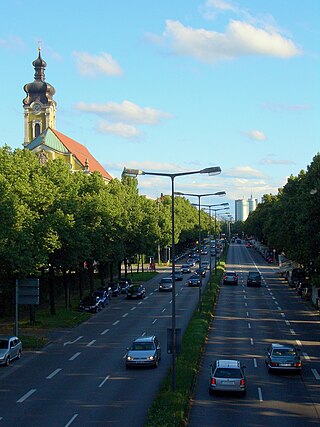History
The avenue, originally called Langwieder Straße, is the main connecting road to the Villenkolonie Pasing II, which was built according to the model of a garden town. The Alte Allee begins at Pippinger Straße, where it forms a triangular square, and leads up to Bergsonstraße. After the junction with Lützowstraße, the district of Obermenzing begins.
The avenue runs parallel to the Munich–Augsburg railway. In the first decades, there was a sporadic development of Villas, until the junction with Gustav-Meyrink-Straße.
Along the Marschnerstraße, the Alte Allee forms the second longitudinal section of the colony's ladder-shaped road network. The continuation of the road to the north occurred in the 1930s, predominantly after the World War II. The avenue lined with lime trees has a historic building which is enclosed by residential buildings and housing estates, which is part of the ensemble Villenkolonie Pasing II.

Munich-Pasing is a railway station in the west of Munich. It is the third-largest station in the city, after München Hauptbahnhof and München Ost.

Neuhausen-Nymphenburg is a borough of Munich, the capital of the German state of Bavaria. It was created from the merger of the former boroughs of Neuhausen and Nymphenburg in 1992.

Moosach is the 10th northwestern district of Munich, Bavaria, Germany. It is sectioned in the urban districts Hartmannshofen, Pressestadt and Borstei.

The August-Exter-Straße, named after the architect August Exter (1858–1933), is a street in Pasing, a district of Munich, which was created in 1892 as part of the development of the Villenkolonie Pasing I.

Rubensstraße, named after the painter Peter Paul Rubens (1577-1640), is a street in Munich's Obermenzing district, which was built around 1897.

The Villenkolonie Pasing I is a single-family house colony in Munich-Pasing.

The Pippinger Straße is a street in the Munich districts of Pasing and Obermenzing, which for centuries runs as the Würmtalstraße on the left bank of the Würm river. The roads full-length runs through rural area, partially with fields on the western side, and undeveloped areas, although the road serves as a main connection to the Bundesautobahn 8.

The Villenkolonie Pasing II is a single-family home colony in Munich-Pasing. It was built according to the model of a garden town.

Barystraße is a street in Munich's Obermenzing district, which was built around 1897. It was named after the doctor and opera singer Alfred von Bary (1873-1926).

The Hofmillerstraße, named after the critic and translator, Josef Hofmiller (1872–1933), is a street in the Munich district of Obermenzing, which was built around 1897.

Lützowstraße is a street in the Munich districts of Pasing and Obermenzing, which was built from 1897 onwards. The street was named after the Prussian Generalmajor Ludwig Adolf Wilhelm von Lützow.

The Marschnerstraße, named after the composer Heinrich Marschner (1795-1861), is a street founded in 1897, in the Munich district of Pasing and Obermenzing.

The Apfelallee is an avenue in the Munich district of Obermenzing, which was created around 1897.

The Rembrandtstraße, named after the painter Rembrandt van Rijn, is a street in the Munich district of Pasing, which was built around 1900.

The following outline is provided as an overview of and topical guide to Munich:

The Mark-Twain-Straße is a street in the Munich district Pasing-Obermenzing, which was built around 1900. It was named in 1947 after the American writer Mark Twain (1835–1910).

The Landsberger Straße is one of the main arterial roads in Munich.

Wolfratshauser Straße is a major road in Munich. It forms part of the Bundesstraße 11 and is named after the city Wolfratshausen south of Munich, in whose direction it leads.

The Landshuter Allee is an avenue in Munich and through most of its course it is part of the Mittlerer Ring, the Bundesstraße 2 R. It joins Donnersbergerbrücke at Arnulfstraße in the Neuhausen district and runs from Dachauer Straße west of the Olympiapark to Moosacher Straße west of the Olympic village in the Moosach district. The B 2R leaves the intersection-free avenue at the Landshuter Allee and continues on the Georg-Brauchle-Ring. The Landshuter Allee now functions as the B 304 and connects the Mittlerer Ring with the northern tangent of the Outer Ring, which is only partially complete. The large width of the Landshuter Allee of 54 metres between the houses is striking. It crosses the Nymphenburg-Biedersteiner Kanal.
This page is based on this
Wikipedia article Text is available under the
CC BY-SA 4.0 license; additional terms may apply.
Images, videos and audio are available under their respective licenses.




















